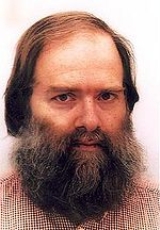
writer and orientalist
(without institutional
affiliation).
He was an editor of the New Right
Flemish nationalist journal Teksten, Kommentaren en Studies
from 1992 to 1995, focusing on criticism of Islam
, various other conservative and Flemish separatist publications such as Nucleus, 't Pallieterke
, Secessie and The Brussels Journal
. Having authored fifteen English language books on topics related to Indian politics and communalism
, Elst is one of the most well-known western writers (along with François Gautier
) to actively defend the Hindutva
ideology.
I am neither a Hindu nor a nationalist. And I don’t need to belong to those or to any specific ideological categories in order to use my eyes and ears.![]()
Conversely, banning this book would send a signal that the present establishment will do what it can to prevent Hinduism from rising up, from regaining self-confidence, from facing the challenge of hostile ideologies.![]()
While one should always be vigilant for traces of totalitarianism in any ideology or movement, the obsession with fascism in the anti-Hindu rhetoric of the secularists is not the product of an analysis of the data, but of their own political compulsions.
![]()
As so often in Indo-Pakistani and Hindu-Muslim comparisons, the argument is reminiscent of the inequality between the contenders in the Cold War: you could demonstrate for disarmament in the West, but to demonstrate for this in the East Bloc (except if it were for unilateral disarmament by the Western “war-mongers”) would have put you in trouble.
![]()
The neologism âdivâsî constitutes one of the most successful disinformation campaigns in modern history.
![]()
In the West, secularism implies pinpricking religious fraud and arrogance, but in India, secularists are the most eloquent defenders of myth and theocracy.
![]()
Future historians will include the no-temple argument of the 1990s as a remarkable case study in their surveys of academic fraud and politicized scholarship.
Category:Authors|Elst, Koenraad![]()

